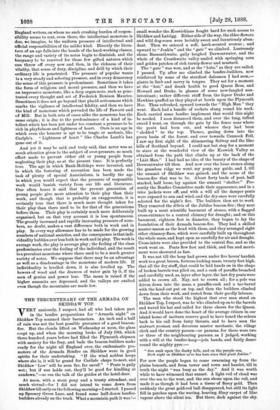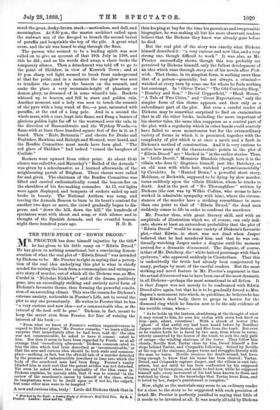THE TERCENTENARY OF THE ARMADA ON SKIDDAW TOP.
TErY anxiously, I suspect, had all who had taken part itn the bonfire preparations for "Armada night" on Skiddaw Top scanned their barometers. An inch and a half of rain was not the best possible precursor of a good beacon- fire. But the clouds lifted on Wednesday at noon, the glass crept up, and when the morning broke of July 19th, which three hundred years before had filled the Plymouth shipmen with anxiety for the fray, and bade the beacon-builders make ready for the night all England over, the enthusiastic pro- moters of the Armada Bonfire on Skiddaw were in good spirits for their undertaking. "If the wind nobbut keeps where she is, it will be grand for Carlisle chaps to-neet, and Skiddaw Low' will be seen far, far extent" " Peals is gaily wet; but if sun holds out, they'll be good for kindling at sundown,"—so ran the talk of the guides at the hotel-door.
At noon, with a stout pony and a trusty attendant, and much victual—for I did not intend to come down from Skiddaw till early on the following morning—I started. I passed up Spooney Green Lane, and found some half-dozen bonfire- bailders already on the track. What a mountain-path it was !—
small wonder the Keswiekia,ns fought hard for such access to Skiddaw and Latrigg. Either side of the way, the elder-flowers and wild dog-roses were lavishly sweet and luxuriously abun- dant. Then we entered a soft, larch-scented avenue ; and upward to " Jenkin " and the " gate " we climbed. Lustrously shone Bassenthwaite, gaily laughed Derwentwater, and the whole of the Crosthwaite valley smiled with springing corn and golden patches of rich turnip-flower and mustard.
The " gate " was won, and at the " huts," as they are called, I 'paused. Up after me climbed the bonfire-builders, now
reinforced by some of the sturdiest dalesmen. I had seen,—
giants in limb and merry in tongue. They sat for a moment at the "hut," and drank health to good Queen Bess, and Howard and Drake, in glasses of some new-fangled non- intoxicant ; rather different stuff from the liquor Drake and Hawkins quaffed as they played at bowls upon the Plymouth Hoe. Thus refreshed, upward towards the "High Man" they went. Each had a bundle of rockets slung round his neck. Each carried some bonfire implement that would this night
be needed. I soon distanced them, and over the long, tufted
sward I went, on through the gate by the fence near where the peats had been cut, and whence they had been " sledded " to the top. Thence, gazing down into the green basin of the forest, and over towards Cannock Fell, I saw my first sight of the shimmering Solway and the lilac hills of Scotland beyond. I could not but stop for a moment to stare at the wonderful view of the Keswick Valley as obtained from the path that climbs up at the back of the " Liiiit Man." I had had no idea of the beauty of the shape of Derwentwater till then. And now over the loose stones along the grassless ridge we went, my pony, my guide, and I, till the summit of Skiddaw was gained, and the scene of the beacon-fire that was to be. About forty loads of peat, half stacked, half loose, lay against the summit " shelter." Pre- sently the Bonfire Committee made their appearance, and in a trice jackets were off, and with a will all the damper peats were exposed to sun and wind, and the dry ones were carefully selected for the night's fire. The builders then set to work
They removed the cUbris of the Jubilee beacon-fire; they next built up a most scientific basement of stones, with a flagged
cross-entrance to a central chimney for draught; and on this basement, eighteen feet in diameter, they began to lay the foundation of their Armada beacon-fire. They had a skilled master-mason as the head with them, and they arranged eight other chimney-flues, which were carefully built up throughout the whole mass, and kept open as carefully for air and draught.
Cross-inlets were also provided to the central flue, and so the work went on. Peats flew fast and thick, and fun and merri- ment were showered as fast.
It was not till the heap had grown under five hours' hardish work to a great brown, fortress-looking mass, twenty feet high, that all the dry stuff, that could be laid hands on in the shape of broken barrels was piled on, and a cask of paraffin broached and carefully used as, layer after layer, the last dry peats were added to crown all. Nay, not to crown all; for a pole was driven down into the mass, a paraffin-cask and a tar-barrel with the head out put on top, and then the builders climbed down from their work, and rested from their goodly labours.
The man who stood the highest that ever man stood on Skiddaw Top, I expect, was he who climbed up on to the barrels and waved his hat and called for three cheers for the Queen.
And it would have done the heart of the average citizen in our island home of taciturn reserve good to have heard the echoes back to his call from lusty throats, and to have seen the stalwart yeoman and decorous master mechanic, the village clerk and the country parson—or parsons, for there were two or three of the neighbouring parsons, as I judged, working with a will at the bonfire-heap—join hands, and fairly dance round the mighty pyre :—
" Sun sank upon the dusky hills, and on the purple sea,
Such night on Skiddaw ne' er has been since that great Jubilee."
For now the people began to come swarming up from the plains beneath, and from tower and town and hamlet, till in truth the night " was busy as the day." And it was worth while to have witnessed that sunset. A light veil of cloud was over the sea to the west, and the sun shone upon the veil, and made it as though it had been a tissue of fleecy gold. Then suddenly the great gold-red ball disappeared, but still its light fell in patches upon the waving, heaving, filmy carpet of lilac vapour above the silent sea. But there, dark against the sky, stood the great, dusky-brown stack,—motionless, and dull, and .meaningless. At 9.30 p.m., the master architect called upon the stalwart son of the fire-god to broach the second barrel of paraffin and besprinkle the top of the pile. A great wind arose, and the air was heard to sing through the flues.
The parson who seemed to be a leading spirit was now called on to give an account of that 19th July in 1588, and this he did ; and as his words died away, a cheer broke the temporary silence. Then a detachment was told off to go to the point of Skiddaw, in view of Keswick Town ; and at 10 p.m. sharp red light seemed to break from underground at that far point, and in a moment the rosy glow was seen to irradiate the crowd by the beacon on the summit, and make the place a very mountain-height of phantasy or demon glory, as dreamed of in some wizard's tale. Rockets whizzed up to heaven, and fell in stars and golden rain. Another moment, and a lady was seen to touch the summit of the pyre with a long wand of fire,—a peat, saturated with -paraffin, at the end of a long pole. And in a second the whole mass, with a roar, leapt into flame, and flung a banner of -glorious golden light far off to the westward over the vale, in the direction of Bassenthwaite and the Wythop Woods,—a lame with at least three hundred square feet of fire in it, as I heard. Then " Rule, Britannia !" and cheers for Drake and Frobisher, Hawkins and Raleigh and Howard, were heard, and the Bonfire Committee must needs have been glad. " The red glare of Skiddaw" had indeed "roused the burghers of Carlisle."
Rockets went upward from either point. At about 10.45 silence was calledfor, and Macaulay's " Ballad of the Armada " -was given by a schoolmaster, as I learned afterwards, of the neighbouring parish of Brigham. Three cheers were called for and given. The chairman of the Bonfire Committee was lifted and carried enthusiastically round the beacon-fire on the shoulders of his fire-making comrades. At 11, red lights were again displayed, and bouquets of rockets sailed up and broke in beauty. The National Anthem was sung, and leaving the Armada Beacon to burn to its heart's content for :another two days or more, the crowd gradually began to dis- perse, and " down the hill, down the hill," the hundreds of spectators went with shout and song, or with silence and in thought of the Spanish Armada, and the eventful beacon-



































 Previous page
Previous page